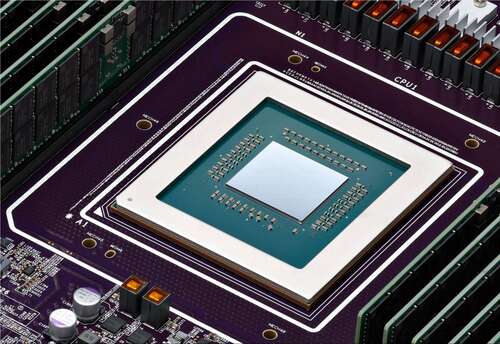
Expected to be available to Google Cloud customers later this year, the Axion chips are already powering YouTube ads and other Google services.
Google has unveiled its first Arm-based chips called Axion as an improvement over its previous chips amid a continuously intensifying global AI race.
In an announcement today (9 April), Google said its Axion chips are the first custom CPUs (central procession units) designed for data centres that are based on technology created by UK-based chip giant Arm.
Google said Axion processors combine its expertise in silicon with Arm’s “highest performing” CPU cores to deliver up to 30pc better performance than the fastest general-purpose Arm-based instances available in the cloud today.
It also claimed that Axion – which will be available to Google Cloud customers later this year – performs up to 50pc better and exhibits up to 60pc better energy efficiency than comparable x86-based instances currently in use.
“While our investments in compute accelerators have transformed our customers’ capabilities, general-purpose compute is and will remain a critical portion of our customers’ workloads. Analytics, information retrieval, and ML [machine learning] training and serving all require a huge amount of compute power,” Google wrote in a blog.
“Customers and users who wish to maximise performance, reduce infrastructure costs and meet sustainability goals have found that the rate of CPU improvements has slowed recently.”
According to the Alphabet-owned company, Axion chips are already powering YouTube ads, the Google Earth Engine and other Google services such as BigTable, Spanner, BigQuery and Blobstore.
“Google’s announcement of the new Axion CPU marks a significant milestone in delivering custom silicon that is optimised for Google’s infrastructure and built on our high-performance Arm Neoverse V2 platform,” said Arm CEO Rene Haas.
“Decades of ecosystem investment, combined with Google’s ongoing innovation and open-source software contributions ensure the best experience for the workloads that matter most to customers running on Arm everywhere.”
Google is not the only major tech company racing to advance in the chipmaking space with Cambridge-based Arm, which filed for an IPO (initial public offering) last August on Nasdaq.
Last year, Apple signed a long-term agreement with Arm to give the iPhone maker access to its chip architecture. Intel, too, entered into a multi-year agreement with Arm to bring new designs into its foundries.
Find out how emerging tech trends are transforming tomorrow with our new podcast, Future Human: The Series. Listen now on Spotify, on Apple or wherever you get your podcasts.

